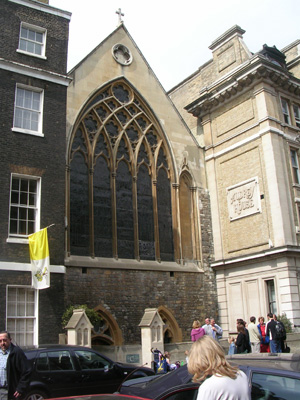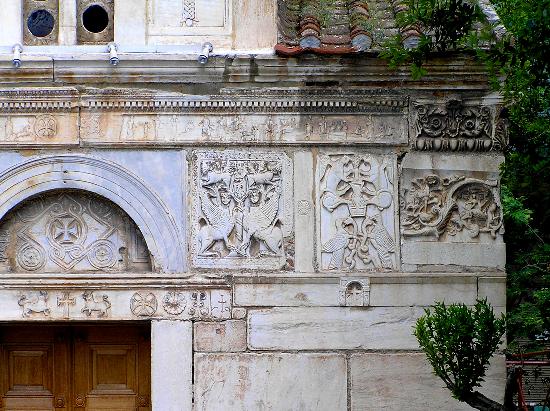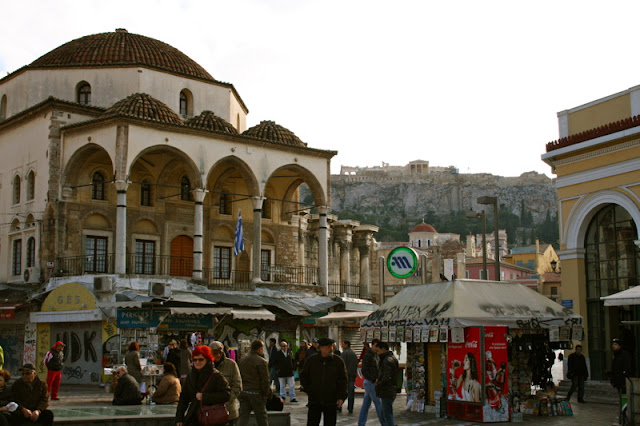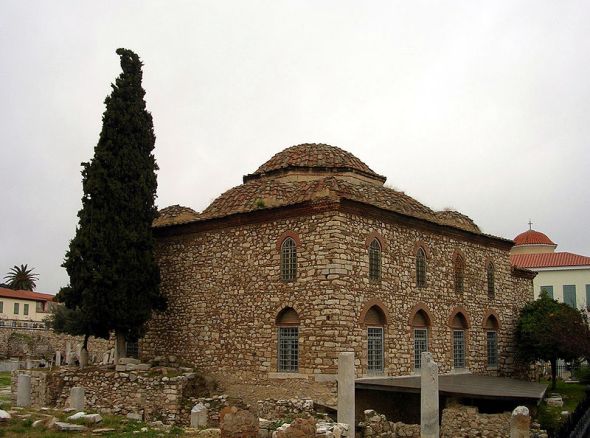
I never read Robert Spencer but this review of his latest book interests me very much. I have blogged before about the complete lack of trustworthy evidence for the life of Muhammad or the origins of Islam.
I became interested about ten years ago in this absorbing detective story (what else is history but detective work, though it should not be fiction?) when I read these two fascinating articles. Not only are they very exciting to any historian (nothing is more beautiful than the sound of an unsubstantiated, orthodox interpretation being exploded) but the story they tell is like an Indiana Jones film.
Robert Spencer, an American whose family is Lebanese Christian, is controversial. His books sell well but are not reviewed by scholars very often. His work is anti-Islam, which is fair enough, rather than anti-Islamist, whatever Islamist means. He speaks Arabic, but he did not learn Muslim history or Koranic studies at university and is a self-taught Muslim scholar. I always warm to people who annoy the academic consensus and, for some reason, almost all right-wing historians do so. (Why did history and the other humanities and social sciences move to the left in the 1960s, just as the working classes in developed countries moved the other way?) He is accused of 'being a hero of the American right' but I am not sure why this is an accusation, rather than a statement of fact. Though I do, of course, accept that the American right are sometimes very unsophisticated and bone-headed in their opinions of Islam. Americans' lack of sophistication is their country's greatest strength, but it can become wearing at times.
Spencer probably should be considered as a pamphleteer more than a historian, but he is more reliable than many who have written about Muhammad, including the very silly former nun, Karen Armstrong, whose biography of him elides the fact that the evidence for his life is extremely late. If mainstream historians have not realised this before (Gibbon drew attention to it and anyway it is very obvious) then it might be better to read Spencer first or revisionists such as Patricia Crone and Michael Cook,
Spencer is braver than Tom Holland, another populariser. Holland, from cowardice - I am talking physical cowardice - skirts the question of whether the Koran existed, as we know it today, in the early 7th century. Nick Cohen is very funny about this here, in his wonderful article 'Tiptoeing in the Mecca Ballroom'.
By the way, what I would give to have come up with that title.
I think the Muslim accounts of the life of Muhammad are too late to have much or even any real historical value, except as evidence that a prophet of that name existed and won battles. Even this is questionable and Spencer, following other writers, does question it.
However, I would say, though I am no scholar, that the prophet mentioned in the Doctrina Jacobi is Muhammad, though some historians have not been convinced. The Doctrina Jacobi describes events in 634 and is dated no later than 640, shortly after the traditional date of Muhammad's death, 632. This is the key passage:
And they were saying that the prophet had appeared, coming with the Saracens, and that he was proclaiming the advent of the anointed one, the Christ who was to come. I, having arrived at Sykamina, stopped by a certain old man well-versed in scriptures, and I said to him: "What can you tell me about the prophet who has appeared with the Saracens?" He replied, groaning deeply: "He is false, for the prophets do not come armed with a sword. Truly they are works of anarchy being committed today and I fear that the first Christ to come, whom the Christians worship, was the one sent by God and we instead are preparing to receive theAntichrist. Indeed, Isaiah said that the Jews would retain a perverted and hardened heart until all the earth should be devastated. But you go, master Abraham, and find out about the prophet who has appeared." So I, Abraham, inquired and heard from those who had met him that there was no truth to be found in the so-called prophet, only the shedding of men's blood. He says also that he has the keys of paradise, which is incredible.The author of this may well have been misinformed about the Prophet's doctrine (the Koran does not claim Muhammad proclaimed the coming of the Christ or has the keys to heaven) and about the fact that he was dead by 634. Or the traditional date for his death may be wrong. It might be that the Koran does not record the teachings of the Prophet accurately.
There is more evidence for Muhammad from early Christian sources here. Particularly striking are the words of Sebeos, a bishop writing in the 660s.
At that time a certain man from along those same sons of Ismael, whose name was Mahmet, a merchant, as if by God's command appeared to them as a preacher [and] the path of truth. He taught them to recognize the God of Abraham, especially because he was learnt and informed in the history of Moses. Now because the command was from on high, at a single order they all came together in unity of religion. Abandoning their vain cults, they turned to the living God who had appeared to their father Abraham. So, Mahmet legislated for them: not to eat carrion, not to drink wine, not to speak falsely, and not to engage in fornication. He said: 'With an oath God promised this land to Abraham and his seed after him for ever. And he brought about as he promised during that time while he loved Ismael. But now you are the sons of Abraham and God is accomplishing his promise to Abraham and his seed for you. Love sincerely only the God of Abraham, and go and seize the land which God gave to your father Abraham. No one will be able to resist you in battle, because God is with you.
So I do not find the argument that Muhammad did not exist persuasive. The most striking piece of evidence of all is that shortly after the time that Muhammad is supposed to have been active Arabs conquered half the civilised world. But it is clear that we know very little reliably about Muhammad.
We have the Koran, it is true, which mentions Muhammad four times, but, if we do not believe that God dictated the Koran, we do not know when and where and why it was written. There is a good case for it being early 7th century, because of the reference to the war between the Byzantine and Persian Empires which was fought between 602 and 628. But we do not know how or when it came into existence, unless we have faith in Islam, and that whereof we do not know thereof must we remain silent.
By the way, this need not worry Muslims. Lack of evidence for Muhammad's life or even existence does not in any way disprove or even undermine their beliefs. Biblical scholarship is a very much harder stumbling black for Christians. Although, having often been told that there was minutely exact information about Muhammad's life, it seems that there is more historical evidence for Jesus's.
What would undermine the Muslim religion, on the other hand, would be evidence to suggest that parts of the Koran were based on Christian hymns, as suggested by Christoph Luxenberg.
Personally, I think Islam is a false religion. If I did not think that, I would be a Muslim. Instead, I am a Christian and therefore I hope all Muslims will convert to Christianity as soon as possible, for their sakes (and I am glad a surprisingly large number are doing so). Yet I respect Islam and believe the Holy Spirit is at work in all the religions. I am not sure St Paul would have agreed, but that is what the Second Vatican Council said. In any case, it appeals to my early 21st century sensibility. I am sure we can learn much from all religions, though I am lamentably ignorant about even my own.
There is much in Islam that is austerely beautiful and all beauty comes from God. I am sure most of the ethical teaching of Islam is true. I admire its simplicity and the emphasis it puts on frequent prayer. I find a sense of God and beauty when I enter mosques, though I also start to think I detect in it something synthetic that reminds me of Communism. At any rate, it certainly feels very Protestant.
I find the Koran seems to be a series of rules and threats of hell, interspersed with promises of Paradise. It does not contain stories and the English translation certainly does not sing, but in the Arabic it is supposed to be very beautiful. The only things I knew about the Koran, before I started to read it (I have only managed a few pages) were Carlyle's and Sebastian Faulks' opinions.
Mr. Faulks said recently:
“With the Koran there are no stories. And it has no ethical dimension like the New Testament, no new plan for life. It says ‘the Jews and the Christians were along the right tracks, but actually, they were wrong and I’m right, and if you don’t believe me, tough — you’ll burn for ever.’ That’s basically the message of the book.”He said much more and was criticised for doing so. Carlyle famously said:
I must say, it is as toilsome reading as I ever undertook. A wearisome confused jumble, crude, incondite; endless iterations, long-windedness, entanglement; most crude, incondite; -- insupportable stupidity, in short! Nothing but a sense of duty could carry any European through the Koran.Other Europeans have been much more polite, though. Tony Blair, for example:
The most remarkable thing about reading the Koran – in so far as it can be truly translated from the original Arabic - is to understand how progressive it is. I speak with great diffidence and humility as a member of another faith. I am not qualified to make any judgements. But as an outsider, the Koran strikes me as a reforming book, trying to return Judaism and Christianity to their origins, rather as reformers attempted with the Christian Church centuries later. It is inclusive. It extols science and knowledge and abhors superstition. It is practical and way ahead of its time in attitudes to marriage, women and governance.This sounds like his praise for Hans Kung. Mr Blair seems to see Muhammad (and Father Kung) doing to religion what Mr Blair did to the Labour Party. To be fair to Carlyle, or to Islam, or both, Carlyle also thought that Islam was a progressive and civilising force. So in its time it was, compared to the idolatry it replaced in Arabia, though not compared to the Byzantine Roman Empire.
Christians and Muslims should and will continue to find ways to coexist - and there are many reasons why they should be natural allies against the materialistic modern world, which replaces the sacred with welfare and the state and regards, for example, abortion, contraception and homosexual marriage as human rights.
Note at Easter 2015: Radiocarbon of the Sana'a MS of the Koran shows something close to the modern Koran existed 70 years after traditional date for Muhammad’s death.
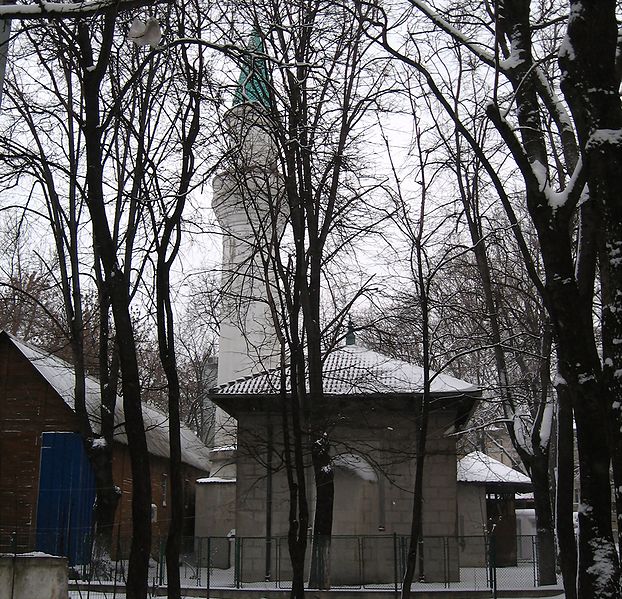 |
| The Bucharest Mosque. I must go and look for it one day. |



